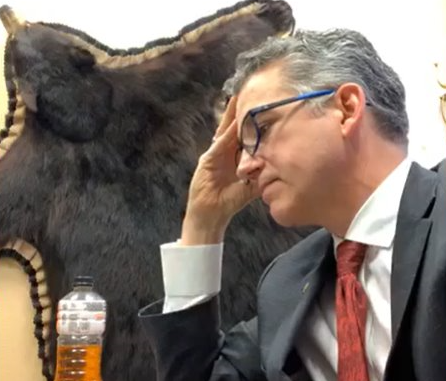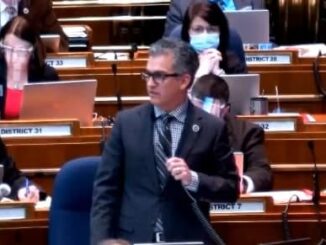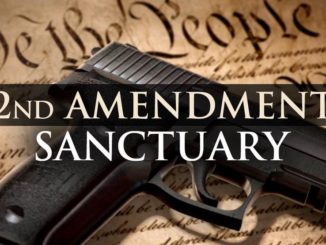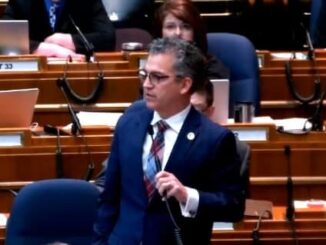
The following article was submitted by Rep. Rick Becker.
In case you are not inclined to read this entire article, here are the bullet points:
- Governor Burgum is a Republican poseur.
- He is diluting what it means to be a Republican.
- He is enabling and encouraging Democrats to control the Republican party.
- Republicans will prove their impotence if they allow it without action.
- Democrats are absolutely stupid for falling for it.
Although I don’t truly know Governor Doug Burgum on a personal level, I gained some good insight from being on the campaign trail with him (as an opposing candidate) in 2016, and as a legislator during his time as Governor.
Doug is a smart guy. He knows systems and appreciates efficiencies. I don’t know if he’s good at the game of politics, because he appears to be just very heavy-handed and throws a ton of money at campaigns. When you have the power of deep pockets, as well as the inherent power of the Governor’s office, you don’t need to excel at the game of politics. I suspect we will be able to determine his political prowess in time.
I do know that when it comes to political philosophy, he has no compass. He’s a get-things-done guy. And while I admire that quality, it becomes very problematic if one doesn’t have the compass to first ask, “Is the thing to get done, something that should be done by government in the first place?” Additionally, Doug tosses the word “conservative” out there quite a bit during campaigns, however, I am confident that his definition would be different than most. His misapplication of the term is no indicator whatsoever of a political philosophy for him. That’s a problem for Republicans, because to misuse a word that defines what it means to be a Republican diminishes the meaningfulness of both the term and the label. I’ll leave it to the reader to determine if that is intentional on his part.
The North Dakota 2016 primary election was quite remarkable. Doug took third place in the state GOP convention, but chose to go to the primary to challenge Wayne Stenehjem regardless. He spent an amount previously unheard of in ND politics in a successful effort to build name recognition to a level on par with his well-known opponent. That was somewhat remarkable, but the truly noteworthy aspect was the very substantial crossover of Democrat voters. In spite of his pandering to conservative voters, his appeal to Democrats as the moderate-progressive was solidified.
Let me remind the reader that in a primary election, the voter must decide what political party they’re going to vote for, and then stay in that column. Unlike the general election, the voter cannot vote for whoever they want regardless of party affiliation. Nearly all states have voter registration. When one registers, they list their party affiliation, which requires them to “stay in their lane”, and only vote for people of the party they registered under. North Dakota is the only state without voter registration. As such, for any given primary election we can choose if we are going to vote in the Republican, Democrat, or Libertarian column regardless with which party we actually identify.
Doug’s appeal to the Democrats as a “Democrat-ish” Republican was so great that in the 2016 primary they left the Democrat column in droves, voting for Doug, and abandoning their own candidates (who were mainly without primary opponents). The temporary exodus was so large, that several Democrat candidates nearly missed getting the bare minimum number of votes to proceed to the general election.
Looking at the primaries since 2008, in which Governor Burgum did not run, we find that for the typical statewide race, Democrat votes amounted to an average of 37% of all votes cast for that race. What happened in 2016 when the Democrats ran to him like a pied piper? The staggering decrease in votes cast by Dems amounted to only 15% of all votes cast for a given statewide race. Applying the 37% average instead, reveals that about 25,000 votes were Democrat crossovers— in a race that Doug won by about 24,000 votes. Now, I’m not crying about the outcome; politics is a game, and we don’t cry over games. Doug played within the rules. Surely it is unsavory and difficult to swallow, but unless the rules change, “Democrat-ish” Republican politicians can rightfully continue recruiting Democrats to get themselves elected.
The 2018 primary returned to a more typical 35.5% of Democrat votes for statewide races. Not at all surprising, however, the Burgum-Democrat tactic of crossover occurred again in 2020, although to somewhat less of an extent. The Democrat portion of votes for statewide races was again extremely low, this time at only 25.5%.
The Burgum-Democrat crossover worked so well in 2016, they apparently thought it was time to test it out on a broader scale in 2020. Doug was running again, but his main focus was on electing hand-picked candidates, or more accurately, defeating conservative candidates willing to oppose his myriad pet projects. He let it be known with an ostentatious two million dollar donation to a PAC he formed specifically for this purpose.
The PAC was a warning shot to legislators who might oppose his policies in the future, but for the purpose of this race, it was a call to arms for his Democrat-crossover army. He plastered words like “consevative” on mailers with pictures of his candidates hunting and doing manual labor— activities a certain type of politician willingly feigns. His crossover friends, however, understood the dog whistle; “Help me defeat these conservatives!” And they did. For example, if you apply the 37% average for the Democrat portion of votes for statewide office to the 2020 primary, you will find that 14,700 votes were likely Democrat crossovers. Dan Johnston lost to Burgum’s State Treasurer pick by 5,000 votes.
It stands to reason that this maneuver also affected legislative races as well, and the numbers bear this out. In District 8, where highly-respected Appropriations Chair Jeff Delzer was ousted after a terribly negative campaign and hundreds of thousands of dollars by Burgum’s PAC, you will see that the Democrat portion of votes was 38% in 2008, and 32% in 2012. But when the Burgum-Democrat machine tactic played out in 2016, Democrats accounted for only 11% of the vote, and then 13% of the vote in 2020. I can’t tell you what the direct effect was on the election outcome, but we can speculate by looking at vote totals. The vote total in the Republican column in 2016 was 4,958 when Doug’s crossovers limited themselves to his race, but surged to 7,304 in 2020 when Democrat crossovers did Doug’s bidding to extend their votes to also take out those he had determined needed to be “shown the door”. We don’t know what portion of the increase was Democrat crossovers vs increased Republican voter turnout, but again we must simply be aware that this game is afoot.
Doug’s political game is obviously bad for the Republican party. Sadly, it’s really bad for the citizens of the state.
And perhaps surprisingly, it is devastating for the Democrat party. Democrat leadership and left-leaning pundits are oblivious to the ramifications of this game they’re playing. I’ll write more on those last two points next time.
Rick Becker was first elected to serve District 7 in the North Dakota State House of Representatives in 2012. He is a plastic surgeon, business owner, and resides in Bismarck.
PLEASE LIKE & SHARE!





